Fact-checking Trump and Biden during 1st 2020 presidential debate
The candidates met live in Cleveland.
President Donald Trump and Democratic nominee for president Joe Biden face off in the first presidential debate of 2020 Tuesday night in Cleveland.
Topics include Trump's and Biden's records, the Supreme Court, COVID-19, the economy, race and violence in U.S. cities, and the integrity of the election.
Below, ABC News will fact check what both candidates say throughout the 90-minute debate, moderated by Chris Wallace of "Fox News Sunday."
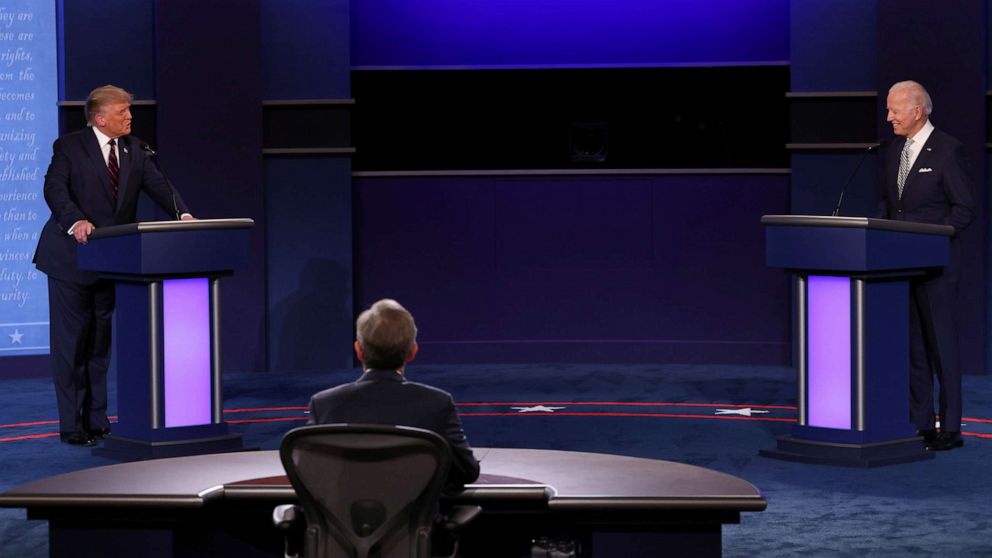
A vaccine is not likely weeks away, despite Trump's claim
TRUMP'S CLAIM: "And now, we're weeks away from a vaccine."
FACT CHECK: Most prominent public health experts have said that a vaccine will not be widely available until mid-2021.
The pharmaceutical company Pfizer has said it may have data from its late-stage trial by October. Moderna has said it could have data from its late-stage trial by November or December. From there, the data will need to be analyzed by the Food and Drug Administration to determine whether the vaccine is both safe and effective. Other companies in late-stage trials are further behind. AstraZeneca's late-stage trial is still on hold, and Johnson and Johnson only just started its late-stage trial this month.
Even if a vaccine is authorized by the end of the year, that does not mean it will be widely available. At first, only limited supplies will be available, and they will be prioritized for the most vulnerable. "By the time you mobilize the distribution of the vaccinations and you get the majority or more of the population vaccinated and protected, that's likely not going to happen until the mid- or end of 2021," Dr. Anthony Fauci, the nation's top expert on infectious diseases, told MSNBC's Andrea Mitchell earlier this month.
In a recent Senate hearing, Centers for Disease Control and Prevention Director Robert Redfield echoed those sentiments, "I think there will be [a] vaccine that will initially be available sometime between November and December, but very limited supply, and it will have to be prioritized," but, he said, "If you're asking me when is it going to be generally available to the American public so we can begin to take advantage of vaccine to get back to our regular life, I think we're probably looking at late second quarter, third quarter 2021."
-Sony Salzman
There are over 100 million Americans in the US with preexisting conditions, studies show
CLAIM: Biden says 100 million Americans have preexisting conditions, Trump says he's wrong
FACT CHECK: 100 million or more people have preexisting conditions in the U.S.
Biden said during the debate that "100 million people" have preexisting conditions, while Trump said that number was "totally wrong."
"There aren't 100 million people with preexisting conditions," Trump said. The two candidates were debating about the path forward for health care in America.
Biden, who was arguing that Trump and Republicans would kick people with preexisting conditions off of health care if they rescinded the Affordable Care Act, is correct that somewhere around 100 million Americans have preexisting conditions, according to studies.
One study by the Health and Human Services Department in 2017 found that a large percentage of non-elderly Americans have preexisting health conditions, ranging from 61 million to 133 million.
The study found that "at least 23 percent of Americans (61 million people) using a narrow definition based on eligibility criteria for pre-ACA state high-risk pools, or as many as 51 percent (133 million people) using a broader definition closer to the underwriting criteria used by insurers prior to the ACA" could have been denied health care or offered it at a high price before the Affordable Care Act passed because of preexisting conditions. The study was published under the Obama administration.
There is a difference, however, between the absolute number of people with preexisting conditions and the number of people who would be denied coverage under the Affordable Care Act. Experts point out that 54 million non-elderly Americans would've been denied insurance before the ACA, but confirmed that 100 million or more Americans have preexisting conditions.
"54 million non-elderly adults have a preexisting condition that would have led to a denial of insurance before the ACA. 100 million or more have a preexisting condition that would have led to higher premiums or limited benefits," tweeted Larry Levitt, executive vice president for health policy at the Kaiser Family Foundation, referring to a study by the organization.
--Cheyenne Haslett
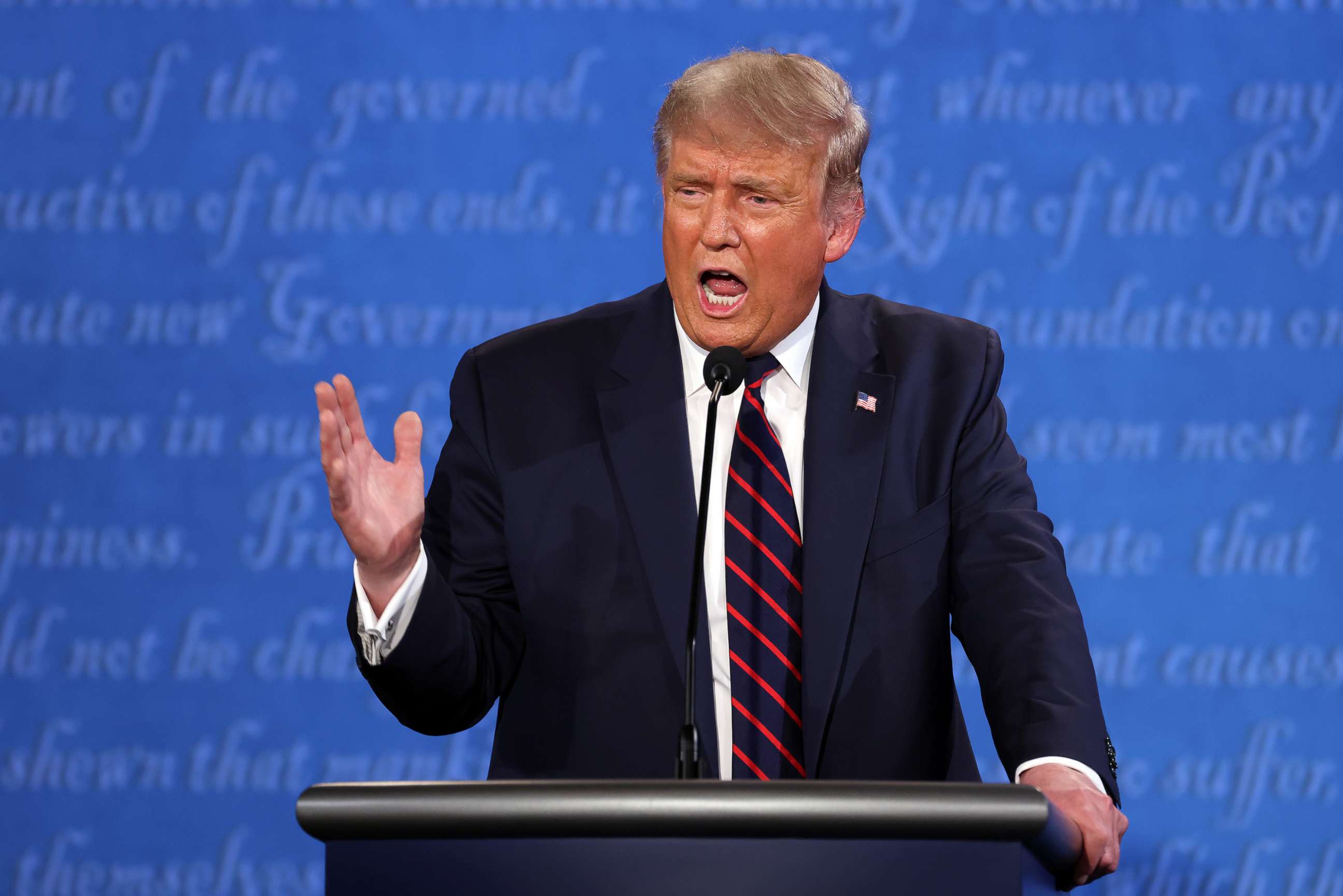
Trump accuses Hunter Biden of making a fortune overseas -- exact sum unclear, but ethics experts have criticized
TRUMP'S CLAIM: "Once you became vice president, [Hunter Biden] made a fortune in Ukraine and China and Moscow and various other places. He made a fortune, and he didn't have a job."
FACT CHECK: While the exact sum of Hunter Biden's foreign business ventures is unclear, ethics experts have broadly taken issue with them – particularly those in places like Ukraine and China, at a time when his father was fronting U.S. policy there.
Robert Weissman, the president of progressive watchdog group Public Citizen, told ABC News last year, "at absolute minimum there's a huge appearance of conflict … [Joe Biden] should have encouraged his son to not take these positions."
Still, Weissman called Hunter Biden's business activity "orders of magnitude" less troubling than how the Trump family has operated its businesses during the Trump administration.
In an interview with ABC News last year, Hunter Biden said he exercised "poor judgment," but maintained that he made no "ethical lapses."
"I gave a hook to some very unethical people to act in illegal ways to try to do some harm to my father. That's where I made the mistake," he said. "So I take full responsibility for that. Did I do anything improper? No, not in any way. Not in any way whatsoever."
"Did I make a mistake? Well, maybe in the grand scheme of things, yeah," he continued. "But did I make a mistake based upon some ethical lapse? Absolutely not."
In their 87-page report released last week, Senate Republicans concluded that Hunter Biden's overseas endeavors were "awkward" and at times "problematic," but stopped short of identifying any criminal activity on Hunter Biden's part or (perhaps more relevant to tonight's debate) any wrongdoing on Joe Biden's part.
--Luc Bruggeman
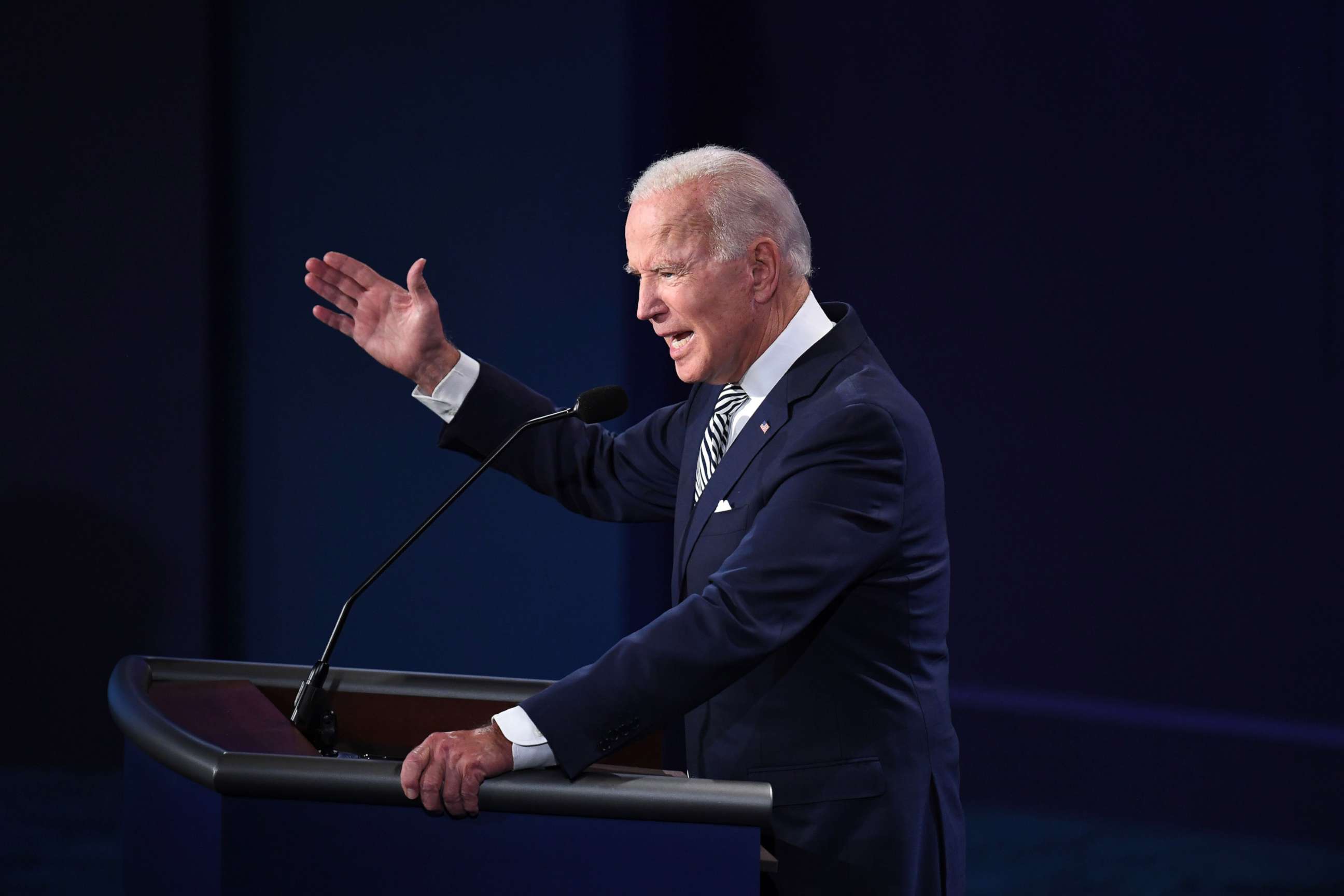
Trump claims Hunter Biden received $3.5 million from Russian billionaire, money that went to a firm with which Hunter Biden denies association
TRUMP'S CLAIM: "Why is it, just out of curiosity, the mayor of Moscow's wife gave your son $3.5 million? ... Wait, he didn't get $3.5 million? ... Why did he deserve $3.5 million from Moscow?"
FACT CHECK: Last week, Senate Republicans unveiled the findings of their highly controversial investigation into Hunter Biden's foreign business dealings -- and specifically whether those endeavors ever influenced U.S. foreign policy.
As part of their report, Republicans highlighted an alleged $3.5 million wire transfer sent from Elena Baturina, the billionaire wife of the former mayor of Moscow, to a bank account tied to Rosemont Seneca Thornton LLC, a consultant group that the committee said was co-founded by Hunter Biden.
George Mesires, a lawyer for Hunter Biden, dismissed the claim outright as "false," adding that Hunter Biden "had no interest in and was not a 'co-founder' of Rosemont Seneca Thornton, so the claim that he was paid $3.5 million is false."
Hunter Biden was involved with Rosemont Seneca Partners -- not Rosemont Seneca Thornton, as the Senate Republicans claimed. The two are separate entities, according to Mesires.
Politico reported on Monday that Trump also sought to engage Baturina's husband, the former Moscow mayor, for business opportunities prior to his time in office.
--Luc Bruggeman and Matthew Mosk
Trump is wrong to suggest Biden is pushing for 'socialized medicine'
TRUMP'S CLAIM: Trump claimed that the Unity Task Forces recommendations between Biden and Sen. Bernie Sanders following the Democratic primary, which the president called a "manifesto," meant Biden is pushing for "socialized medicine."
FACT CHECK: The claim doesn't line up with the health care plan Biden has put forward, and the task force recommendations are not binding.
Trump said at Tuesday's debate that Biden "agreed with Bernie Sanders on a plan. Absolutely agreed to socialized ... socialized medicine."
While the unity task force calls for the establishment of a "high-quality public option plan" that is administered by the government and not private companies, it is not a binding document and it does not mention "Medicare for All" or the elimination of private insurance.
Also, the former vice president has repeatedly said he does not support socialized medicine, including throughout the Democratic primary. Instead, he has called for building on the Affordable Care Act, which does not eliminate private insurance.
Biden's stance against Medicare for All, which would overhaul the health care system and implement a single-payer, government-run system was a signature position throughout the Democratic primary.
Biden has also stated that even the coronavirus pandemic has not changed his mind on not supporting a single-payer health care system. "Single-payer will not solve that at all," Biden said during an interview on MSNBC.
--Will Steakin
Trump rallies have been held indoors, with COVID-19 cases linked to them
TRUMP'S CLAIM: Trump claims his campaign rallies have been "outside" and had "no negative effect" on the spread of COVID-19.
FACT CHECK: At the debate, Trump defended his campaign's decision to continue holding large-scale, mostly maskless campaign rallies in the middle of a pandemic, claiming that he has held them outside and that they had "no negative effect," even though at least one rally has been held indoors and multiple cases of COVID-19 have likely been linked to them.
After Trump's very first rally in Tulsa, Oklahoma, on June 20, the city county health director there said the rally "more than likely contributed" to the surge of cases the followed in the area soon after. Eight of President Donald Trump's campaign staffers also tested positive for COVID-19 later that month, with two of them receiving positive results after attending the same Tulsa rally, the Trump campaign confirmed to ABC News.
Last week, the Michigan Department of Health also confirmed at least one person who had attended Trump's rally in Freeland, Michigan, on Sept. 10 had tested positive for the virus. The health department, however, said it was unclear whether the person had the virus prior to attending the rally or contracted while there or after, and was "unaware" of any outbreak associated with the rally. More broadly, no major outbreaks have been directly connected to the rallies.
Minnesota Department of Human Services spokesperson David Verhasselt told ABC News that a "couple of" individuals who went to Trump's rally there in Aug. 17, had tested positive for the coronavirus, but added that "we only know what people tell us," saying that "it is possible that we are seeing cases in individuals who choose not to fully declare their activities."
"We just don't know what people don't tell us," he said.
Most recently, a Wisconsin health department also confirmed at least one case had been linked to Trump's rally in Oshkosh, Wisconsin, in August.
The president has also held at least one indoor rally in recent weeks, though most of them have taken place in semi-outdoor airport hangars, which Dr. Anthony Fauci, the nation's top infectious disease specialist, said was an improvement.
"If you have to get a group of people together for whatever purpose, do it outdoors," Fauci said. "If you do it in a semi-indoor [location], make it modified indoor with an incredible amount of airflow and wear a mask."
The campaign also holds other indoor events regularly.
--Olivia Rubin
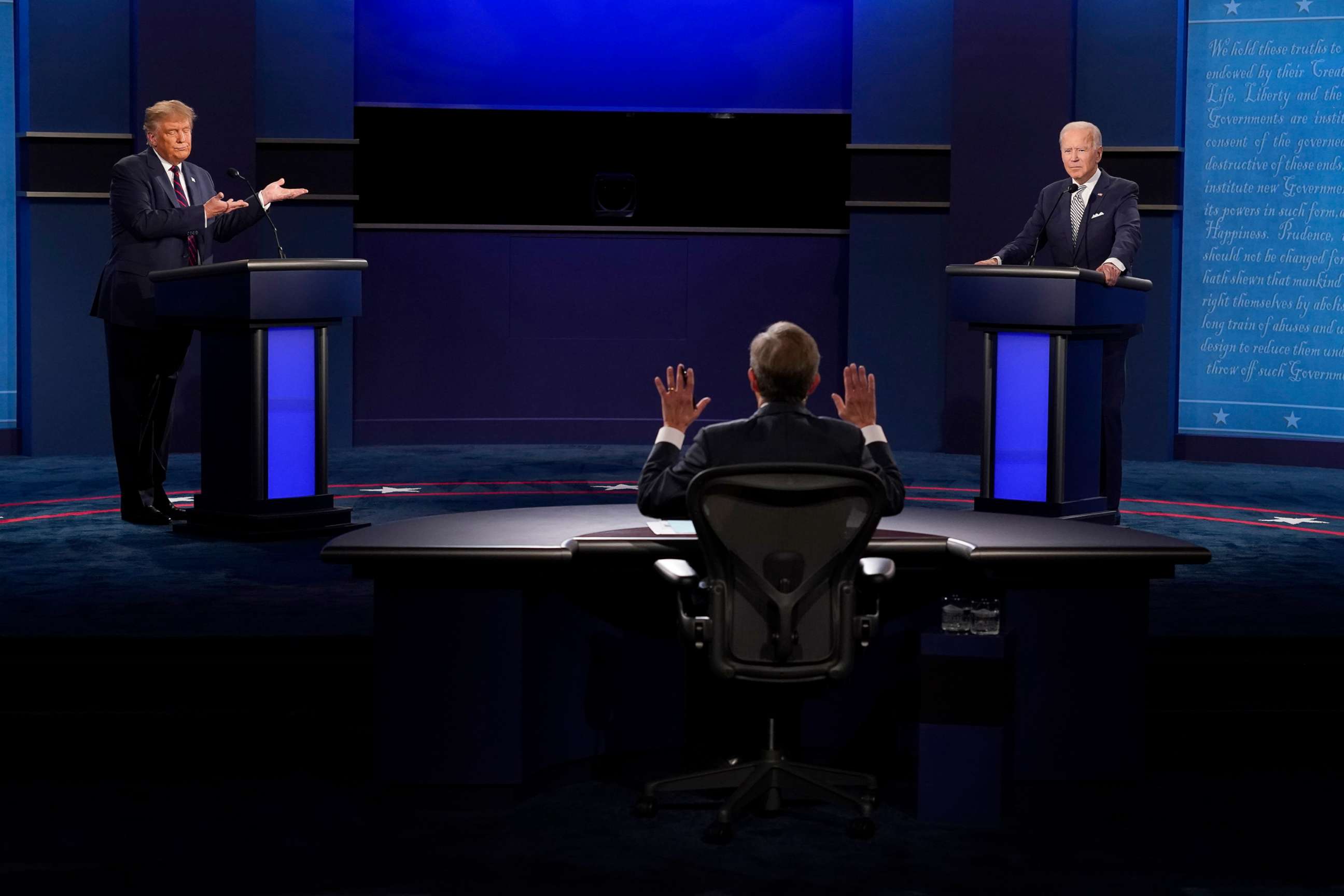
Biden claims Trump 'hasn't lowered drug costs for anybody'
BIDEN'S CLAIM: "He has executive orders that have no power. He hasn't lowered drug costs for anybody."
FACT CHECK: Trump signed an executive order in September aimed at lowering drug costs by trying to reduce the prices Medicare pays for prescription drugs, but experts have said it is unclear what authority the president has to carry it out.
His orders, if enacted, would lower drug prices by directing drugmakers to offer their medicines to Medicare at the same prices they do in other countries. However, the process is likely to take months, and court challenges should be expected.
Even though the president claimed that "drug prices will be coming down 80% or 90%," the president has not yet produced a plan that would lower drug prices by that amount for the majority of Americans, despite promising to do so since taking office four years ago. In fact, according to groups that track drug prices, pharmaceutical companies have continued to hike costs on drugs this year. In an analysis released earlier this month, GoodRx found drug prices are surging faster than any other medical service or good, increasing by 33% since 2014.
What Trump has done is try to increase the availability of generics. He also has tried to curb costs paid by seniors on Medicare, the government-run health care insurance plan for older Americans.
But the administration's latest plan on insulin -- limiting Medicare copays to $35 per month -- doesn't start until next year, according to details released by his administration. And while many insulin makers have agreed to limit costs, there's no guarantee that insulin will become cheaper for Americans not on Medicare. According to SingleCare, a single vial can cost $250.
--Elizabeth Thomas and Anne K. Flaherty
Trump ignores full picture on forest management
TRUMP'S CLAIM: "Every year, I get the call, 'California's burning. California's burning.' If that was cleaned, if you have forest management, good forest management, you wouldn't be getting those calls."
FACT CHECK: Trump's repeated comments connecting forest management and wildfires ignores the increasing impact on climate change on how quickly the fires develop and spread.
Trump has focused on forest management when talking about wildfires in western states, often criticizing local leaders who have disagreed with his response to climate change.
While decisions about how to manage forests and wildfires are important, Trump's stance disregards evidence that climate change is playing a significant role in why wildfires have become so destructive in recent years.
During a briefing on wildfires in California earlier this month Trump refuted State Secretary for Natural Resources Wade Crawfoot when he described the impact of increasing heat and drought on the conditions that lead to fires. Trump said, "It'll start getting cooler," directly contradicting conclusions by climate scientists who argue temperatures around the world will continue to rise by saying, "I don't think science knows actually."
Increasing heat and droughts are "supercharging" wildfires by creating drier conditions for trees and brush. Warmer temperatures have also decreased moisture from melting snow and allowed bark beetles to travel further north, killing millions of trees, according to the National Climate Assessment published in 2018.
These factors allow fires to spread more quickly.
As the planet continues to warm, those conditions will only get worse, making wildfires more dangerous, climate scientists say.
The majority of land impacted by wildfires in states like California, Washington and Oregon is also managed by the federal government, which proactively removes dead trees and brush and conducts controlled burns to keep forests healthy.
--Stephanie Ebbs
Trump overstates role of China travel restrictions
TRUMP'S CLAIM: "It's China's fault, it should have never happened. They stopped it from going in. But it was China's fault. By my doing it early -- in fact, Dr. Fauci said, 'President Trump saved thousands of lives.' Many of your Democrat governors said, 'President Trump did a phenomenal job.'"
FACT CHECK: Trump is overstating his early actions in containing the virus by suggesting his travel restrictions from China were critical.
While Dr. Anthony Fauci has confirmed that those restrictions were important, Trump is omitting a major miscalculation he made early on in the pandemic -- not restricting travel from Europe.
Up to 75% of the coronavirus specimens circulating in the New York City area in early March were genetically similar to strains seen in Europe and other areas of North America, according to a Centers for Disease Control and Preventionstudy published in July.
Although Fauci has said that the president's travel restrictions did save lives, he has also stated on numerous occasions that if mitigation efforts such as social distancing and mask wearing were implemented earlier, then many lives could have been saved. "I mean, obviously, you could logically say that if you had a process that was ongoing and you started mitigation earlier, you could have saved lives. ... If we had right from the very beginning shut everything down, it may have been a little bit different," Fauci said during an interview on CNN in April.
--Arielle Mitropoulos
Trump falsely claims ballots accepted after Election Day is 'fraud'
TRUMP'S CLAIM: Can you imagine where they say you have to have your ballot in by Nov. 10? Nov. 10. That means that's seven days after the election, in theory, should have been announced. We have major states with that -- all run by Democrats, all run by Democrats. It's a fraud. It's a rigged election.
FACT CHECK: It is true that mail ballots arriving after Nov. 3 will be counted in several states, but these ballots are not fraudulent.
For these mail ballots to be counted, they must be postmarked on or before Election Day, and in some states, they must be postmarked by the day before the election.
In a normal election year, 19 states accept ballots that arrive after the election, as long as they are properly postmarked and arrive within a state-specific timeline, between three and 14 days post-election, according to the National Conference of State Legislatures. These states are not "all run by Democrats" either. Alaska, Iowa, Maryland, Mississippi and Ohio -- all states with Republican governors currently -- have postmark-by deadlines on the books, even when there isn't a pandemic causing widespread changes to voting.
More states will have postmark-by deadlines for the November election, due to both court rulings and changes implemented by state officials.
In Wisconsin on Tuesday, for example, a federal appeals court upheld a lower court's ruling, which ordered county election officials to accept ballots received up to six days post-election as long as those ballots were postmarked on or before Nov. 3. Other battleground states where court rulings have extended the deadline for mail ballots to arrive include Michigan, Pennsylvania and Georgia, but the extension is being challenged in all three states.
In Kentucky, Democratic Gov. Andy Beshear and Republican Secretary of State Michael Adams reached a bipartisan agreement in mid-August to accept ballots returned by mail through Nov. 6, as long as those ballots are postmarked on or before Nov. 3.
--Quinn Scanlan
Trump pushes false claim that many states are mailing 'unsolicited ballots'
TRUMP'S CLAIM: "As far as the ballots are concerned, it's a disaster. A solicited ballot, OK? Solicited is OK. You're soliciting. You're asking, they send it back, you send it back. I did that. If you have an unsolicited -- they are sending millions of ballots all over the country. There is fraud."
FACT CHECK: Despite Trump claiming that states across the country are mailing out "unsolicited ballots," that is only true in nine states plus Washington, D.C.
In two states, Montana and Nebraska, most or some counties are mailing ballots to voters.
In fact, 41 of 50 states, voters are required to request an absentee ballot before being mailed one by election officials. Of those 41, only nine are proactively mailing registered voters applications to request an absentee ballot.
Of those states mailing ballots to voters, five -- Colorado, Oregon, Utah, Hawaii and Washington -- were already holding all-mail elections before the coronavirus pandemic. Officials in those states have seen no evidence of widespread fraud, and those voters are likely used to receiving ballots without requesting one.
Also, in four of the nine states mailing ballots -- Oregon, Washington, Utah and Nevada -- Republicans currently run elections. Only Nevada is considered a battleground in the presidential race among the states mailing ballots.
--Kendall Karson
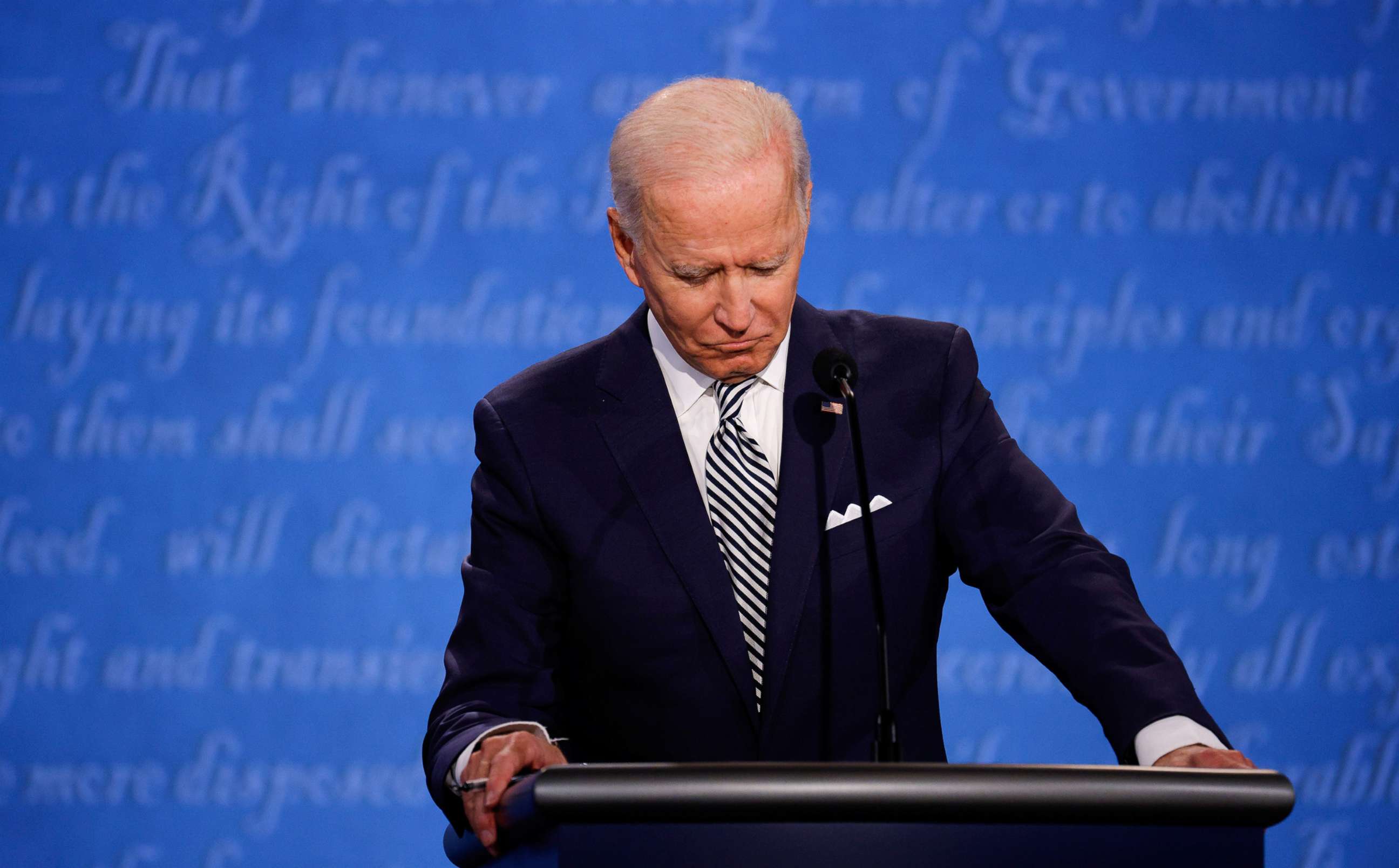
Why weren't poll watchers allowed into Philadelphia early voting sites?
TRUMP'S CLAIM: "As you know, today there was a big problem. In Philadelphia they went in to watch, they were -- they are called poll watchers. A very safe, very nice thing. They were thrown out. They weren't allowed to watch. You know why? Because bad things happen in Philadelphia. Bad things."
FACT CHECK: The supporters, who sought to observe the polls, were blocked from entering the early voting sites because poll watchers' certifications for early voting have not been issued for anyone, including the Trump campaign. Also, early in-person voting is only at satellite election offices, not polling places, and poll watchers are only certified at polling places on Election Day, an elections official confirmed.
"Satellite Offices are not Polling Places (and) poll watcher certificates have not been issued for any individuals for anything other than poll watching activities on Election Day at Polling Places," Nick Custodio, deputy to Lisa Deely, chairwoman of the Philadelphia City Commissioners, said in a statement to ABC News earlier on Tuesday.
Unless voters are there to utilize register to vote, request mail ballots, fill them out in-person, and submit them to clerks, they are not allowed in. Officials are also limiting the number of people in the election offices due to the pandemic. "This is particularly important in the current environment as City buildings and offices remain closed to the public due to COVID-19," Custodio said in the statement.
Candidates are allowed to appoint two poll watchers, and political parties are allowed to appoint three, per precinct, who are permitted inside polling places to observe, challenge the qualification of voters, and potentially raise legal challenges, according to state law. Poll watchers must be registered to vote in the county the precinct they are observing is located.
Republicans are pushing for to allow partisan poll watchers to be stationed in counties outside of their residence in an ongoing legal fight in Pennsylvania. The state Supreme Court ruled against the GOP, limiting poll watchers to only counties where they live, but state Republicans asked the U.S. Supreme Court to weigh in.
--Quinn Scanlan and Kendall Karson
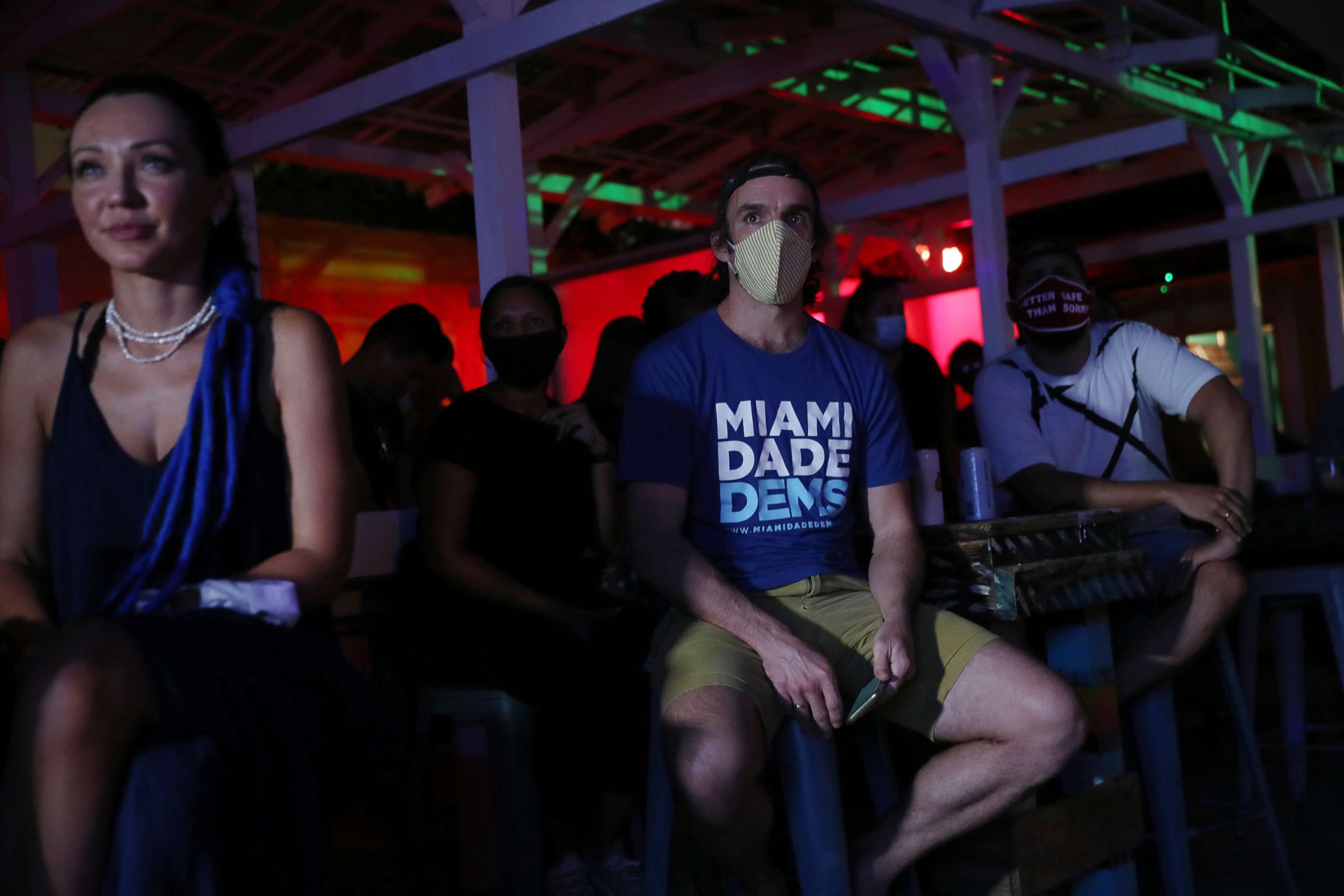
Fauci, other experts changed mind on people wearing masks
TRUMP'S CLAIM: When asked about the wearing of masks, Trump said that medical experts, including Dr. Anthony Fauci said that "masks are not good. Then he changed his mind."
When Biden asserted that if all Americans wore masks, and social-distanced between now and January, 100,000 lives could be saved, Trump asserted that experts have said the opposite.
"Dr. Fauci said the opposite," Trump said. "He said very strongly."
FACT CHECK: Although at the beginning of the pandemic, the Centers for Disease Control and Prevention and the World Health Organization, as well as Fauci and other top experts, initially discouraged wearing masks, the recommendationto wear a mask is now almost unanimous among health experts. Many of the president's own appointees have been very vocal in encouraging the American people to wear masks to curtail the spread of the disease.
Early on in the pandemic, there were concerns that masks and other personal protective equipment were in short supply for health care workers who needed them.
While Fauci mainly cited the need to conserve masks, he did say early in the pandemic during an interview with "60 Minutes" that wearing a mask may also have unintended consequences, such as leading people to touch their faces more often to adjust them, spreading germs from their hands.
The CDC changed its recommendation in early April and recommended the general public wear face coverings, based on evidence that a significant number of people who were asymptomatic or not yet feeling sick were transmitting the virus.
--Arielle Mitropoulos
Biden and the Green New Deal
BIDEN'S CLAIM: "The Green New Deal is not my plan." "No, I don't support the Green New Deal." "I support the Biden plan that I put forward, which is different than what he calls the radical Green New deal."
FACT CHECK: While Biden has not fully supported the Green New Deal, he has embraced and adopted several key rhetoric and elements of the progressive agenda.
In its extensive clean energy plan released earlier this year, the Biden campaign described the Green New Deal as "a crucial framework for meeting the climate challenges we face."
The $2 trillion plan, which was put forth after Biden tapped Rep. Alexandria Ocasio-Cortez, D-N.Y., along with former Secretary of State John Kerry, to lead his climate task force, includes some core concepts of the Green New Deal, including the need to "embrace greater ambition on an epic scale to meet the scope of this challenge," and that "our environment and our economy are completely and totally connected." The plan also puts forward a goal to achieve a 100% clean energy economy and to reach net-zero emissions no later than 2050.
Biden's climate plan however, leaves out some of the more debated features of the Green New Deal, such as Medicare for All and a jobs guarantee.
ABC News' Meredith Deliso, Justin Fishel, Soorin Kim and Mark Osborne contributed to this report.




